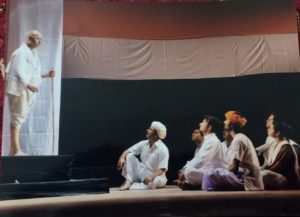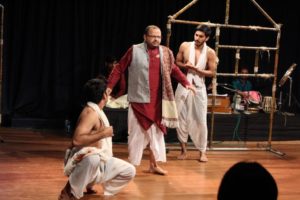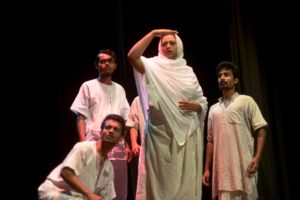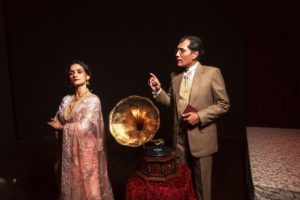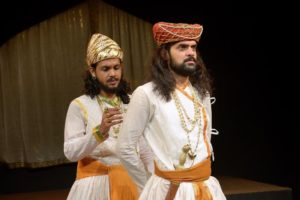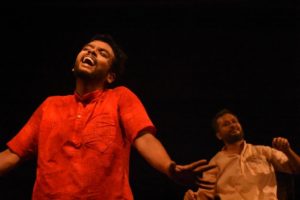Arjun Deo Charan’s HIND SWARAJ
(Based on Mahatma Gandhi’s book)
Adaptation & Director: Arjun Deo Charan
Group: Rammat, Jodhpur
Language: Hindi
Duration: 1 hr 20 mins
The Play & Director’s Note
Why Hind Swaraj? Anybody can ask this question. Why is this book that was written in the first decade of 20th century being presented in the second decade of 21st century- an era of ultra-modernity? Did we receive the independence that Gandhiji dreamt of? In the name of independence blacks have replaced the white. Independence does not mean just a change in government, but a change in the overall lifestyle. It is like preparing a new land for the struggle for human values. This is why Gandhiji spoke of removing the English culture. He did not want the western influence on Indian land. But this is exactly what has happened. The rulers have changed, the vision has not. The generation born after independence is unaware of the freedom struggle undertaken by our ancestors.
We have tried to present this struggle through the play. It is an effort to convey Gandhi ji’s dream to the young generation, which he saw for the freedom of India in 1909. He was then in South Africa carrying out the Satyagraha. In this presentation Gandhiji has indicated the danger of the imposed western civilisation on India. This book can also be called a discussion on civilisation. Our production investigates the propaganda that the British worked for the so-called development which, on the contrary, was for the benefit of power.
What a dilemma it is that the youth of India, although familiar with the name of Gandhi, is unaware of his vision. I hope that the society understands his principles of truth, non-violence, love and Satyagraha through this play. The whole world considers our values eternal but we disregard them.
The book, along with creating the context of Satyagraha Andolan, also gives us a glimpse of India’s freedom struggle. I hope that this production will be successful in establishing Gandhi’s vision in the society.
The Director & Adaptor
Dr. Arjun Deo Charan is an established Rajasthani poet, playwright and critic. He has written nineteen plays, has directed over thirty plays and has participated in many seminars at the national level. Some of his published works include plays like Do Natak Aajra, Bol Mhari Machhali Itto Pani, Dharam-Judh, Virasat, Mugti Gatha, Jaatra and Jamleela; poetry collections Rindhrohi, Ghar To Ek Naam Hai Bharose Ro and Agan Sinaan; monographs Rawalon ki Rammat and Satya Prakash Joshi. He has also translated Mrichhkatikam, Nag Mandal and Caucasian Chalk Circle into Rajasthani. Dr. Charan has been awarded by Sahitya Academy, New Delhi; Sangeet Natak Akademi, New Delhi; Rajasthani Bhasha Sahitya and Sanskriti Academy; Rajasthan Sangeet Natak Academy; and Bihari Puruskar of K.K. Birla foundation. Presently he is the officiating Chairman of National School of Drama Society.
The Group
Rammat was founded three decades ago. It has been a movement that provides buoyancy to Rajasthani Theatre. It has had the privilege to be a part of festivals of repute like National Theatre Festival (1992) by Sangeet Natak Academy, Delhi; Multi-Language Theatre Festival (1992), Bharat Bhawan, Bhopal; National Theatre Festival (2000) by Kerala Sangeet Natak Akademi, and the 6th and 17th Bharat Rang Mahotsav (2004), NSD and 8th Theatre Olympics.
Cast & Credits
On Stage: Deepak Bhatnagar, Mahesh Mathur, Ashish Charan, Mag Singh, Krishan Tak, Rahul Bora, Ashish Nabariya, Naveen Chitara, Kapil Daiya, Mahendra Rawal, Kushal Lodha, Nitish Borana, Dheeraj Choudhary, Mohit Baniya, Vishal Jatav, Arjun Kumar, Bhanwar Lal, Sandeep Khetani
Backstage: Md.Shaffi, Mag Singh, Mahendra Rawal, Hemant Choudhary
Adaptation & Direction: Arjun Deo Charan
Based on the book ‘Hind Swaraj’ by Mohandas Karamchand Gandhi
